Life with cats is full of surprises, mysteries, and behaviors that are just plain weird.
Case in point: when your cat plops down in front of a wall and, with his face just an inch or two away, meows at it.
And this isn’t a one-time occurrence, either. Your cat can easily spend an hour or more just sitting there, staring at the wall and talking to it like an old friend.
What’s the deal with this bizarre behavior? Is your cat perceiving something you’re not, or is this just one of those inexplicable cat hobbies?
Let’s find out the truth about cats and walls — once and for all!
One Possibility: You’ve Got Pests
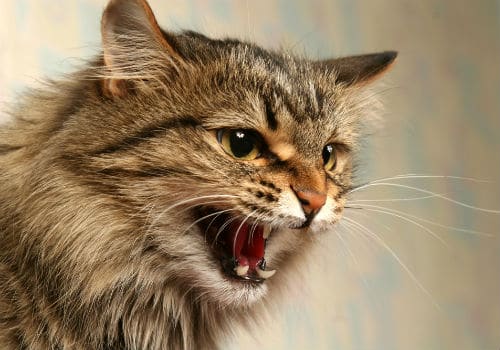
The space inside your walls may not be of much use to you, but it’s an ideal spot for pests like mice and rats to make a cozy home.
Think about it: if you were a small, largely defenseless prey animal, wouldn’t you also be drawn to a place that’s calm, private, sheltered, and warm? And wouldn’t you be doubly drawn to it if it was in close proximity to massive supplies of food and nesting materials?
Even if you don’t see pests in your home, they could still be there, lurking inside the walls.
And they could be driving your cat insane.
Thanks to his acute sense of hearing, he can hear them pitter-pattering in the walls. And his nose, which is 20 times more powerful than a human’s, can smell them and the trails of scent they leave behind in their wake.
His instinct tells him to seek out these tiny rodents and attack them for food or fun. But even though he can track them down, he can’t get to them when they’re tucked safely inside the walls.
So his frustration builds and builds until he can do nothing but cry — which, for a cat, takes the form of incessant meowing. Being so close yet so far from his prey takes a big toll on him, and he may develop a singular fixation on the pests lurking in the bones of your home.
How to Stop Your Cat from Meowing at Pests in the Walls
Even if they weren’t making your cat meow at the walls, you wouldn’t want pests like mice and rats in your home anyway.
They’re unsanitary and destructive, getting into your pantry and cabinets to eat your food, then leaving disease-spreading droppings behind. And there’s nothing more annoying than trying to fall asleep when a mouse doesn’t stop scurrying around in the wall behind your bed.
Plus, it’s just straight-up dangerous to have mice and rats in your walls. They could easily chew through electrical wiring, starting a fire that could destroy your home.
And even if they don’t, inevitably, one will eventually die behind your walls, resulting in a putrid stench and an influx of new pests such as flies.
In short: get rid of those rodents!
Set Traps to Catch Pests
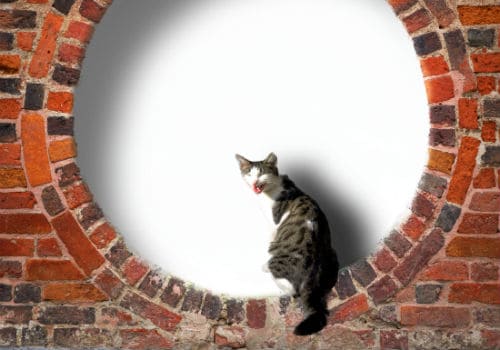
If your cat repeatedly meows at a particular spot, there’s a good chance that there’s a mouse or rat nest there. Thank him and give him plenty of pets — he’s just taken care of the most challenging part for you.
You’ll need to cut a small hole in the wall to get inside and place a trap. The spot your cat favors is likely a hotspot for the pests, so start there.
We recommend using humane traps, shaped like tubes with a spring-loaded door that snaps shut when a mouse enters the trap.
You can load the trap with bread or peanut butter, set it and wait for the snapping noise. Once you make a catch, you can relocate the mouse to a new location, such as a park.
Set traps in your kitchen, too, for it’s the room that mice and rats frequent the most. Place a trap or two if you’ve noticed mouse droppings in a particular area, like your pantry.
And while you’re at it, check the exterior of your house for holes where mice could get in, like dryer vents, utility pipes, and wiring holes. Fill those holes with spray foam insulation or another gap filler to prevent more mice from entering your home and setting up camp in your walls.
What About the Ceiling?
Do your cat’s nonstop meowing and staring seem to be directed at the ceiling rather than the walls? If so, other pests like bats could be to blame.
In these cases, getting your cat to stop meowing at the ceiling will require slightly different tactics. Head into your attic or open up your drop ceiling and shine a bright light around the inside.
The bright light will startle bats, squirrels, and anything else living in your ceiling. They’ll take off towards the nearest exit, so watch their paths and make a note of their exit point.
Then go outside, locate the exit point, and seal it up. As an extra precaution, you can fill your ceiling with fiberglass insulation to deter the pests from returning to your ceiling and agitating your cat again.
Another Explanation: Walls Stimulate the Senses
Staring at a wall sounds like the most boring thing you could do — it’s even less exciting than watching paint dry. It seems like your cat is staring and meowing at nothing for no reason.
But if our eyes and ears were as powerful as a cat’s, maybe we’d feel differently about it.
Forget TV, I’ll Watch the Wall
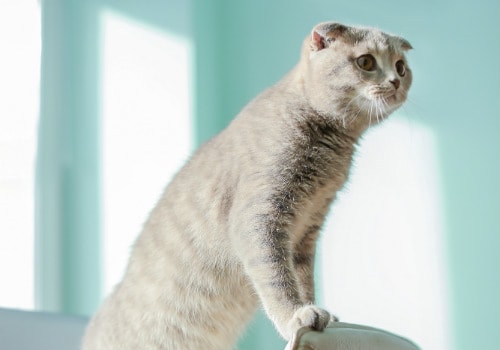
Where we see nothing but dull drywall and flat colors, cats see a range of fascinating things that are almost psychedelic. Their sharp vision enables them to see the tiniest details and movements.
The slightest shadow from a gently-rippling curtain… a tiny speck of dust reflecting the sun’s rays as it drifts along… a cobweb on the ceiling causing patterns of light to change near the floor…
To your cat, these minute stimuli are more engrossing than the flashiest film or the most opulent fireworks display. He simply can’t look away, and he’ll happily spend hours on end watching the walls.
Altered Acoustics
So your cat likes watching dust, shadows, and light bounce off the walls. Fair enough, but what’s with the meowing?
Well, his eyes aren’t the only superpowered sensory organs he’s equipped with. His ears are much stronger than ours, so he hears things we can’t fathom.
Try this: put your face up to the wall and say something. Notice how different it sounds from when you speak out into open space?
The reverberations of your voice against the wall change the tone, timbre, pitch, and distribution of the sound. And the same thing happens when your cat meows at the wall.
But the effect is even more intense for him since he’s able to hear much finer details and a more comprehensive range of pitches. And he may find these variations absolutely fascinating.
Like a voice changer or a cool microphone effect, the wall makes your cat sound more interesting, at least to his ears. Hey, you know what they say: one person’s annoying feline vocalizations are another’s avant-garde musical experiments!
[amazon bestseller=”cat automatic litter box”]
How to Make Your Cat Stop Meowing at the Wall for Fun
If meowing at the wall seems to be a hobby for your cat, you can get him to stop by redirecting his attention to something a little less annoying. The trick is to make sure that it fulfills the same needs that wall-meowing does.
In other words, you’re looking for something visually exciting and aurally captivating.
The good old laser pointer is a classic feline favorite, but it’s been updated for the modern age. Automated laser pointers do the pointing for you, keeping your cat occupied and your hands free.
And you can please his ears with new sounds from classic toys, like a toy mouse that makes squeaking noises or a catnip-stuffed bird that squawks like a real parrot.
Cat’s Meows and What They Mean (Video)
10 Related Questions About Cat Meows
1. How can I tell if there are pests in my walls without removing the wall?
Listen for noises such as scratching or scurrying. Check for feces, urine stains, or insect remains near the walls. Observe if your cat or other pets display unusual behavior around the walls.
2. Are there any other signs that my cat is trying to alert me to pests in the walls?
Other signs include your cat pawing at walls, sniffing intently, or meowing persistently near a particular area. These behaviors might indicate that your cat senses pests behind the walls.
3. What are some alternative methods for pest control that are safe for cats?
Use natural repellents like diatomaceous earth or essential oils, place traps or glue boards in areas inaccessible to cats, or hire a professional exterminator who uses pet-safe methods.
4. Can cats’ sensitivity to sounds and smells cause them to stress in certain situations?
Yes, cats’ heightened sensitivity to sounds and smells can cause stress in noisy or strong-smelling environments. Their acute senses make them more reactive to stimuli humans might not notice.
5. How can I help my cat cope with the frustration of not being able to reach pests in the walls?
Provide distractions like toys, playtime, or puzzle feeders. Create a calming environment with a comfortable resting spot away from the walls. Address the pest issue promptly to eliminate the source of frustration.
6. Are there any health risks for my cat if they continuously meow at walls due to pests?
Continuous meowing itself is not a health risk, but stress and frustration can weaken a cat’s immune system. Persistent meowing may also indicate an underlying health issue that needs veterinary attention.
7. Can certain wall materials or textures cause cats to be more interested in staring at them?
Cats may be drawn to textured walls if they resemble surfaces they like to scratch. However, their interest in walls is more likely due to sounds or smells associated with pests.
8. What other cat behaviors might indicate the presence of pests in the home?
Cats might stalk, pounce, or intensely focus on specific areas if they sense pests. Changes in their eating, grooming, or sleeping habits may also indicate the presence of pests.
9. How can I prevent pests from entering my home in the first place to avoid this issue?
Seal cracks and crevices, maintain cleanliness, store food properly, eliminate excess moisture, and regularly inspect your home for signs of infestation to prevent pests from entering.
10. Are there any breeds of cats that are more prone to this wall-staring and meowing behavior?
No specific breed is more prone to wall-staring and meowing behavior, as these behaviors are generally related to a cat’s individual personality, curiosity, or the presence of pests.
"In ancient times cats were worshipped as gods; they have not forgotten this."
-- Terry Pratchett


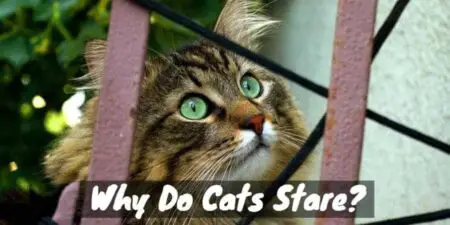

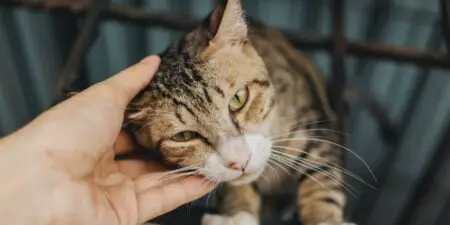
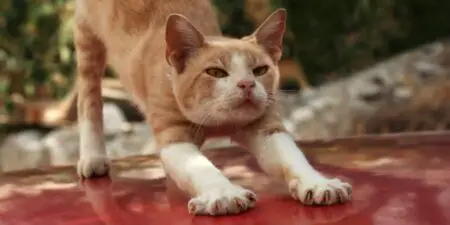
cats are so adorable. Sometimes they hella cute but also feisty!